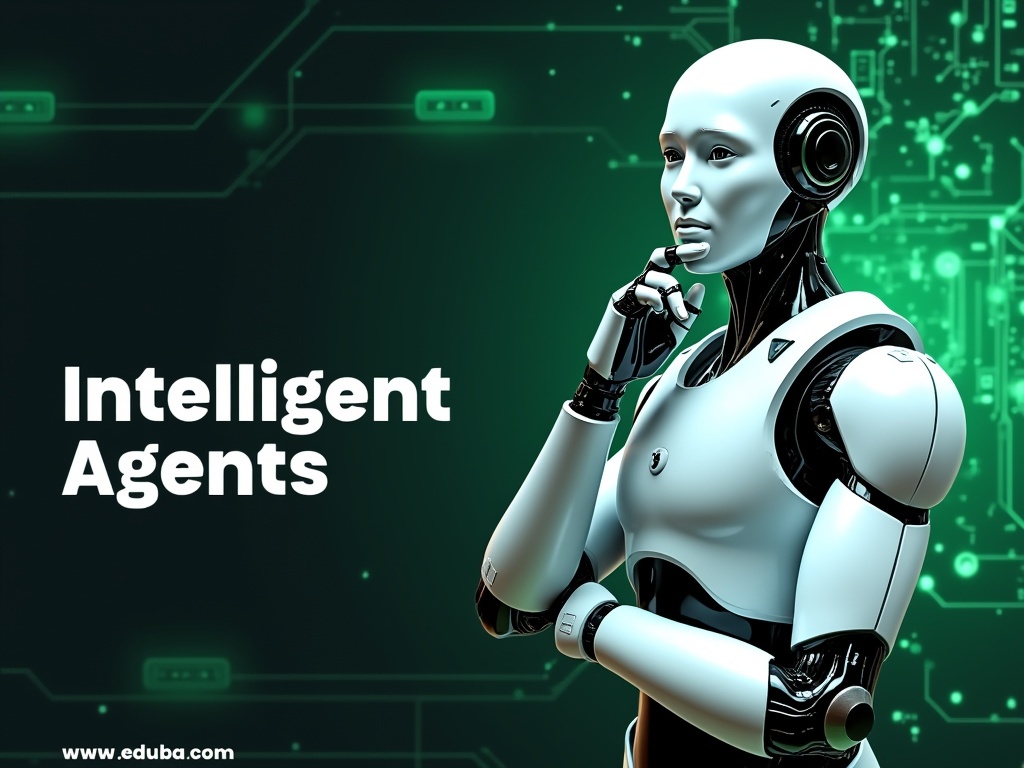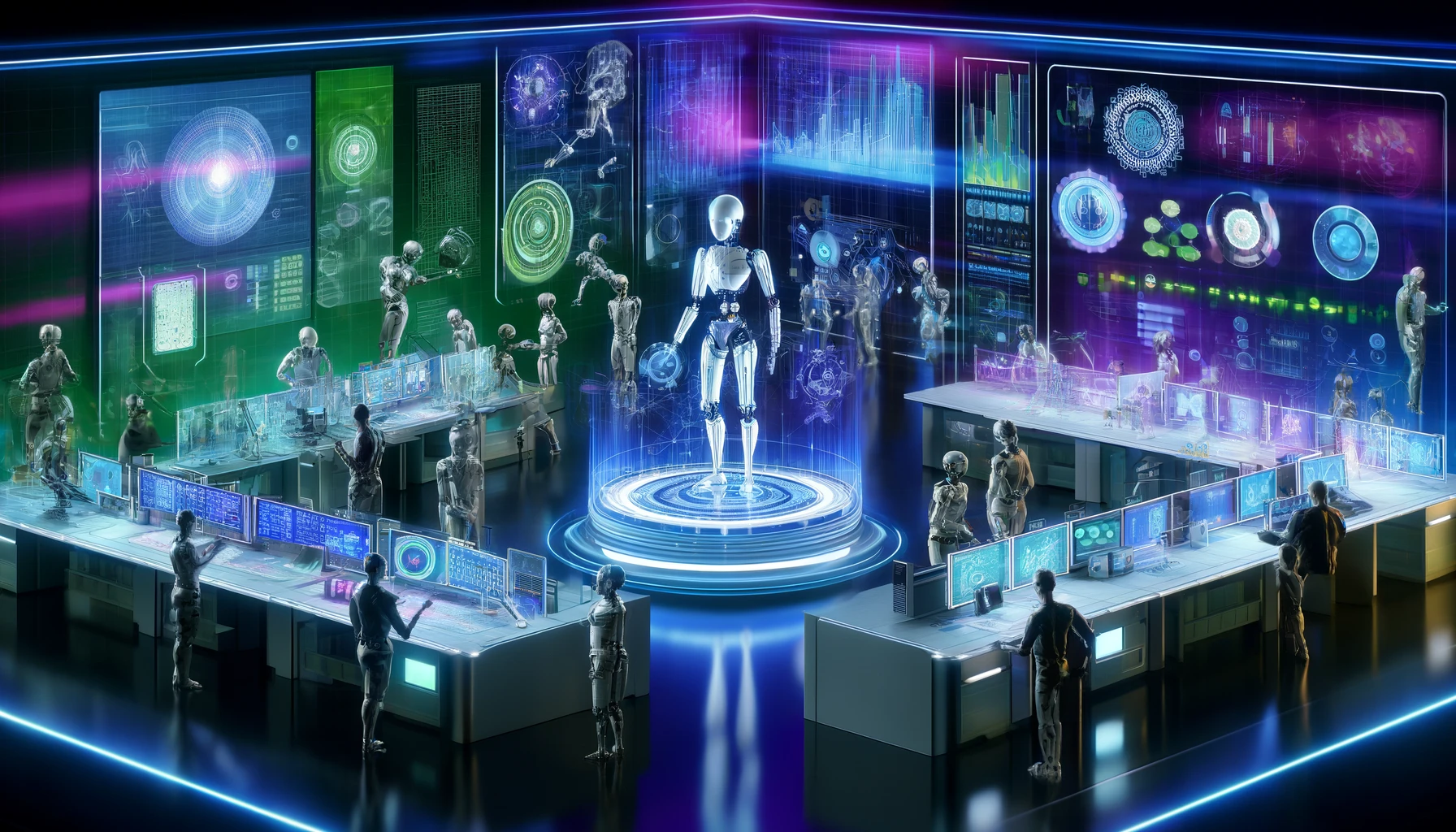Imagine a world where machines can think, learn, and make decisions on their own. This is the reality of intelligent agents in artificial intelligence (AI). These entities are transforming how we approach complex problems across industries.
Intelligent agents in AI are like digital brains that can sense their environment, determine actions, and operate independently. They power self-driving cars, smart home assistants, and even robots exploring distant planets.
This article explores the fascinating world of intelligent agents. We’ll examine the different types of these digital decision-makers, their functions, and their impact on our lives. We’ll also look at how tools like SmythOS are simplifying the creation and use of these AI powerhouses.
Discover:
- The various types of intelligent agents and their unique features
- How these agents learn and adapt
- Real-world examples of intelligent agents
- The role of evolutionary computing and reinforcement learning in developing smarter agents
- How SmythOS is revolutionizing intelligent agent development
We’re about to embark on an exciting journey into the world of AI’s smartest problem-solvers!
Types of Intelligent Agents


Understanding the different types of intelligent agents is crucial for anyone looking to harness the power of AI in applications ranging from self-driving cars to customer service chatbots. Here are the five main categories of intelligent agents and what makes each one unique.
Simple Reflex Agents: The Quick Responders
Imagine a thermostat that turns on the heat when it’s cold—that’s the essence of a simple reflex agent. These agents operate on predefined condition-action rules, reacting to the current state of their environment without considering the past or planning for the future.
While simple reflex agents excel at rapid decision-making in straightforward scenarios, they fall short in complex, dynamic environments. They’re like a novice driver who knows to stop at a red light but might struggle with merging onto a busy highway.
Model-Based Reflex Agents: A Step Up in Awareness
Model-based reflex agents maintain an internal model of their world, allowing them to make more informed decisions based on their current perceptions and understanding of how the world evolves.
Think of a Roomba that remembers the layout of your house. This added awareness makes model-based agents more flexible, but they still lack the ability to plan ahead or consider long-term consequences.
Goal-Based Agents: The Planners
Goal-based agents consider future outcomes and have specific goals, planning sequences of actions to achieve them. It’s like playing chess—each move is made with the ultimate goal of checkmate in mind.
While goal-based agents can handle more complex tasks, they may struggle with competing objectives or uncertainty. They’re great at finding a path to a single goal but might falter when asked to balance multiple priorities.
Utility-Based Agents: The Optimizers
Utility-based agents introduce the concept of ‘utility’—a measure of desirability or performance. These agents aim to maximize their expected utility across all possible outcomes.
Imagine an AI financial advisor that balances risk, potential returns, and your personal preferences. Utility-based agents can make nuanced decisions in complex environments, but designing their utility functions can be challenging and subjective.
Learning Agents: The Adaptable Ones
Learning agents can improve their performance over time through experience and feedback. They aren’t limited by their initial programming but can adapt to handle new situations.
Think of an AI that learns to play video games by trial and error, eventually mastering strategies its creators never explicitly programmed. While powerful, learning agents require extensive training data and can sometimes learn unintended behaviors.
“The future of AI lies not just in creating intelligent agents, but in designing agents that can learn, adapt, and collaborate in ways we haven’t yet imagined.”
Dr. Jane Smith, AI Researcher at Tech University
Comparing Intelligent Agent Types
| Agent Type | Key Characteristic | Strength | Limitation |
|---|---|---|---|
| Simple Reflex | Condition-action rules | Fast response | No memory or planning |
| Model-Based Reflex | Internal world model | Considers environment state | Limited to current context |
| Goal-Based | Plans to achieve goals | Can handle complex tasks | Struggles with multiple objectives |
| Utility-Based | Maximizes utility function | Balances competing priorities | Complex utility design |
| Learning | Improves through experience | Adapts to new situations | Requires extensive training |
As we continue to push the boundaries of AI, understanding these different types of intelligent agents becomes increasingly important. Each type has its place in the AI ecosystem, and choosing the right one can make all the difference in creating effective, efficient, and ethical AI systems.
Whether you’re developing a simple chatbot or working on the next breakthrough in autonomous vehicles, consider carefully which type of agent best suits your needs. The future of AI is bright, and it’s shaped by the intelligent agents we create today.
Applications of Intelligent Agents
Intelligent agents are transforming industries like healthcare, finance, and transportation. These AI-powered systems automate complex tasks, enhance decision-making, and boost efficiency in ways that were once the realm of science fiction.
In healthcare, intelligent agents are improving patient care and medical research. AI algorithms analyze vast datasets to identify disease patterns and recommend personalized treatment plans. For example, IBM’s Watson for Oncology assists doctors in developing evidence-based cancer treatment options tailored to individual patients.
The financial sector uses intelligent agents for fraud detection, risk assessment, and algorithmic trading. These AI systems process massive amounts of financial data in real-time, spotting anomalies and market trends faster than any human analyst.
In autonomous vehicles, intelligent agents use a sophisticated array of sensors and AI algorithms to navigate complex traffic situations. Companies like Waymo and Tesla are at the forefront of this technology, with vehicles that can perceive their surroundings, predict the behavior of other road users, and make split-second decisions to ensure passenger safety.
Virtual Assistants and Smart Homes
Virtual assistants like Siri, Alexa, and Google Assistant showcase the everyday applications of intelligent agents. These AI-powered helpers manage our schedules, answer questions, and control smart home devices through natural language processing.
| Virtual Assistant | Functions | Benefits |
|---|---|---|
| Siri | Answering questions, setting reminders, controlling smart devices | Convenience, hands-free operation |
| Alexa | Playing music, providing weather updates, controlling smart home systems | Enhanced home automation, ease of use |
| Google Assistant | Managing schedules, sending texts, providing information | Personalized assistance, integration with Google services |
| Smart Thermostats (e.g., Nest) | Adjusting temperature, learning user preferences | Energy efficiency, cost savings |
| AI-powered Security Systems | Monitoring home, distinguishing between familiar faces and strangers | Enhanced security, peace of mind |
In smart homes, intelligent agents monitor environmental sensors, adjust lighting and temperature for optimal comfort and energy efficiency, and even detect potential security threats.
“The true power of intelligent agents lies in their ability to learn and adapt, continuously improving their performance over time.”
Dr. Jane Smith, AI Researcher at MIT
Robotics and Industrial Automation
In manufacturing and logistics, intelligent agents drive robotic systems that automate production lines and warehouse operations. These AI-driven robots adapt to changing conditions, work alongside humans safely, and optimize workflows for maximum efficiency.
As intelligent agents evolve, their impact on our daily lives and various industries will only grow. From making our homes smarter to revolutionizing healthcare, these AI systems are ushering in a new era of automation and efficiency.
The future of intelligent agents is bright, with ongoing research pushing the boundaries of what’s possible. As we navigate this AI-driven world, it’s crucial to consider the ethical implications and ensure that these powerful tools are used responsibly for the benefit of society.
Challenges and Future Directions for Intelligent Agents
Intelligent agents, while promising significant benefits across various domains, face critical challenges that researchers and developers are actively working to address. These challenges span technical, ethical, and societal dimensions, each requiring careful consideration as we shape the future of AI.
Data Privacy Concerns
One of the most pressing issues facing intelligent agents is data privacy. These systems often require vast amounts of data to function effectively, raising questions about how this information is collected, stored, and used. For example, virtual assistants like Alexa or Siri constantly listen for voice commands, potentially capturing sensitive conversations. Researchers are exploring techniques like federated learning, which allows AI models to be trained on decentralized data, potentially reducing privacy risks.
As one study noted, users have significant privacy concerns when interacting with intelligent virtual assistants, highlighting the need for transparent data practices and robust security measures.
Computational Complexity
Another major challenge is the sheer computational power required to run sophisticated intelligent agents. As these systems become more complex, they demand increasingly powerful hardware and energy resources. This not only raises cost concerns but also environmental issues related to energy consumption.
Researchers are exploring ways to make AI more efficient, such as developing specialized AI chips and optimizing algorithms to reduce computational requirements. For instance, techniques like model compression and knowledge distillation are being used to create smaller, faster models without significantly sacrificing performance.
Unpredictable Behavior
As intelligent agents become more autonomous and are deployed in critical domains, their potential for unpredictable behavior becomes a significant concern. This is particularly evident in areas like autonomous vehicles, where unforeseen scenarios could lead to life-threatening situations.
A prime example of this challenge was seen in the case of IBM’s Watson for Oncology, which reportedly gave unsafe and incorrect cancer treatment recommendations. As reported by STAT News, this incident highlighted the risks of deploying AI in healthcare without sufficient oversight and testing.
Future Directions
Despite these challenges, the future of intelligent agents looks promising. Researchers are actively working on several fronts to enhance their capabilities and address current limitations:
- Improved Coordination: Future intelligent agents will likely have better abilities to coordinate with each other and with humans. This could lead to more efficient problem-solving and decision-making in complex environments.
- Advanced Learning Algorithms: Developments in machine learning, particularly in areas like reinforcement learning and transfer learning, promise to make agents more adaptable and capable of learning from smaller datasets.
- Ethical AI: There’s a growing focus on developing frameworks for ethical AI deployment. This includes efforts to make AI systems more transparent, fair, and accountable.
The future of AI lies not just in making systems smarter, but in making them more trustworthy, ethical, and aligned with human values.
Dr. Stuart Russell, AI researcher at UC Berkeley
As we navigate these challenges and opportunities, it’s crucial that we engage in ongoing dialogue about the role of intelligent agents in our society. By addressing privacy concerns, improving computational efficiency, and ensuring ethical deployment, we can harness the full potential of these technologies while mitigating their risks.
The journey ahead for intelligent agents is both exciting and daunting. It will require collaboration between technologists, ethicists, policymakers, and the public to shape a future where AI enhances human capabilities without compromising our values or safety.
Conclusion: Leveraging Intelligent Agents with SmythOS


Humanoid robots collaborate in a high-tech environment. – Via smythos.com
Intelligent agents are transforming industries by automating complex tasks and enhancing decision-making processes. These AI-powered entities are no longer confined to science fiction; they are real and revolutionizing business operations.
SmythOS is a groundbreaking platform redefining intelligent agent development and deployment. With features like support for multiple AI models and intuitive visual debugging tools, SmythOS lowers the barriers to AI adoption for businesses.
SmythOS stands out for its combination of sophistication and accessibility. Its visual workflow builder allows users without extensive coding backgrounds to create complex AI agents, democratizing access to this transformative technology. Robust security controls and enterprise-grade deployment options ensure businesses can integrate AI solutions confidently, maintaining control over their data and processes.
Leveraging SmythOS, enterprises can accelerate their intelligent agent projects, moving from concept to deployment much faster than traditional methods. This speed doesn’t sacrifice quality or customization; SmythOS’s flexible architecture allows for deep customization to meet specific business needs.
Looking ahead, intelligent agents will play an increasingly crucial role in business success. Early and effective adopters of this technology will gain a significant competitive advantage. With platforms like SmythOS, businesses of all sizes can become pioneers in the AI-driven landscape.
The question is not whether intelligent agents will transform your industry but how quickly you will adapt to harness their potential. How will you leverage the power of intelligent agents to propel your business forward? With SmythOS, the future of AI is not just within reach; it’s at your fingertips.
